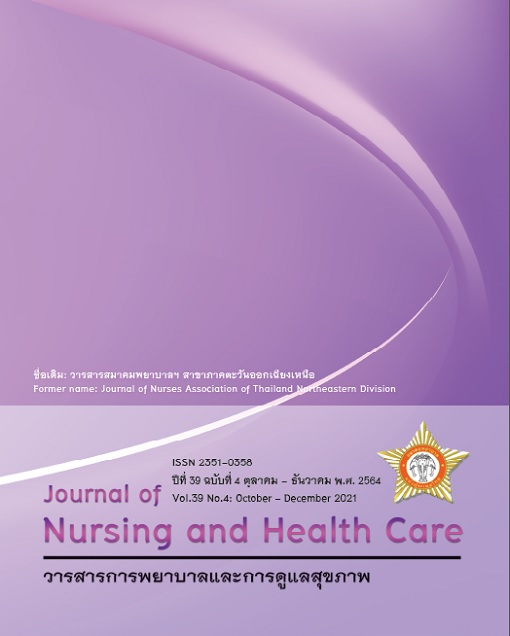The การประเมินหลักสูตรการพยาบาลเฉพาะทางสาขาการพยาบาลสุขภาพจิตและจิตเวชชุมชน
คำสำคัญ:
การประเมินหลักสูตร, หลักสูตรการพยาบาลเฉพาะทาง, การพยาบาลสุขภาพจิตและจิตเวชชุมชน, พยาบาลเฉพาะทางบทคัดย่อ
การวิจัยนี้เป็นวิจัยเชิงประเมินเพื่อประเมินบริบท ปัจจัยนำเข้า กระบวนการ ผลผลิต และผลกระทบของหลักสูตรการพยาบาลเฉพาะทางสาขาการพยาบาลสุขภาพจิตและจิตเวชชุมชนรุ่นที่ 1 และ 2 ตามแนวคิด CIPP Model กลุ่มประชากรเป็นผู้เข้าอบรมจำนวน 40 คน และผู้รับบริการ จำนวน 40 คน เก็บรวบรวมข้อมูลเชิงปริมาณด้วยแบบสอบถาม และเก็บข้อมูลเชิงคุณภาพด้วยการทำสนทนากลุ่ม วิเคราะห์ข้อมูลเชิงปริมาณด้วยค่าเฉลี่ย ส่วนเบี่ยงเบนมาตรฐาน และวิเคราะห์ข้อมูลเชิงคุณภาพด้วยการวิเคราะห์เนื้อหา ผลการวิจัยพบว่า ด้านผลกระทบมีค่าเฉลี่ยมากที่สุด ได้แก่ ความพึงพอใจของผู้รับบริการ (x̅= 4.50, S.D = 0.54) และความพึงพอใจของผู้เข้าอบรม (x̅ = 4.17, S.D = 0.62) ค่าเฉลี่ยรองลงมาได้แก่ด้านปัจจัยนำเข้า (x̅= 4.09, S.D = 0.53) และด้านผลผลิต (x̅= 4.00, S.D = 0.66) ตามลำดับ การวิเคราะห์เชิงเนื้อหา พบว่า ด้านบริบทวัตถุประสงค์ โครงสร้าง และเนื้อหาหลักสูตรมีความเหมาะสมสอดคล้อง ด้านปัจจัยนำเข้าอาจารย์มีความรู้และสามารถถ่ายทอดได้ดี ควรปรับปรุงสิ่งสนับสนุนในห้องเรียน ด้านกระบวนจัดการเรียนการสอนควรใช้รูปแบบผสมผสาน ด้านผลผลิตผู้เข้าอบรมได้รับประสบการณ์ตรงทางการพยาบาลจิตเวชชุมชน เสนอแนะให้ปรับการจัดการเรียนรู้โดยให้ความรู้พื้นฐานทางจิตเวชกับผู้เรียนก่อนเข้าอบรม และเพิ่มระยะเวลาการฝึกปฏิบัติ สำหรับผู้รับบริการ ได้รับความรู้ และต้องการได้รับการดูแลในชุมชนอย่างต่อเนื่อง และเสนอแนะให้ศึกษาวิจัยด้านผลกระทบของการให้บริการสุขภาพจิตและจิตเวชในชุมชนต่อไป
Downloads
เอกสารอ้างอิง
2. Department of Mental Health. Annual Report 2020 of Department of Mental Health. Department of Mental Health, Ministry of Public Health. 2020.
3. Department of Mental Health. The report of patients who received mental health services in Thailand of fiscal year 2018 [Internet]. 2020 [cited 2020 July 31]. Available from: https://www.dmh.go.th/report/datacenter/map/.
4. Intarabumrung K. The curriculum evaluation on bachelor degree of education program in early childhood education faculty of education, Silpakorn University. Veridian E-Journal, SU. 2015; 8(1): 700-713.
5. Juntapim S, Nuntaboot K. Care of schizophrenia patients by the community. Journal of Nursing and Health Care. 2018; 36(2): 68-76.
6. Junvas W, Ekwarangkoon P. The follow up study of nursing specialty curriculum in renal replacement therapy nursing for kidney expert nurses Thailand Nursing and Midwifery Council. Thai Journal of Nursing. 2014; 63(3): 56-64.
7. Kimsungneun N. An evaluation research of the nursing specialty in nursing of persons with drug and substance uses. Bangkok: Princess Mother National Institute on Drug Abuse Treatment. 2010.
8. Maha Y, Vatanasin D, Nabkasorn C. The effects of holistic caring program on self-care behaviors and self-esteem among patients with schizophrenia. Journal of Phrapokklao Nursing College. 2019; 30(2): 37-50.
9. Mental Health Center, Department of Mental Health. Mental Health Prevention Information System [Internet]. 2020 [cited 2020 July 30]. Available from: http://mpis.srithanya.go.th/mhc/TotPopulation.aspx
10. Onsampant S. The curriculum evaluation of master of education program in education administration, faculty of education, Silpakorn University. Silapakorn Educational Research Journal. 2017; 9(1): 12-27.
11. Onsri P, Wacharagate S, Kulpakdee R. An evaluation of the nursing specialty in nursing administration program at the Royal Thai Army Nursing College. Journal of The Royal Thai Army Nurses. 2014; 15(3):342-352.
12. Pliankerd P, Kerdsiri S. The competency of psychiatric nursing in the practice of nursing. Journal of The Royal Thai Army Nurses. 2014; 15(2): 160-165.
13. Prukkanone B, Sirisamutr T, Doungthipsirikul S, Teerawattananon Y. A comprehensive intervention mental health program model of mental health service in 6 priority areas. Nonthaburi: Project code: 000-363-2554, Health Intervention and Technology Assessment Program. 2013.
14. Somphong P. An evaluation of training program of nursing specialty in nurse practitioner (primary medical care) faculty of nursing, Srinakarinwirot University [dissertation]. Bangkok: Srinakarinwirot University. 2012.
15. Stufflebeam DL. “THE CIPP MODEL FOR EVALUATION.” in evaluation models viewpoints on educational and human services evaluation. 2nd ed. Boston: Kluwer Academic Publishers. 2000.
16. Stufflebeam DL, Shinkfield AJ. Evaluation theory, models & applications. CA: Jossey - Bass. 2007.
17. Thianthong A, Punthai B. An evaluation of a specialized nursing program in the field of infection control nursing at Ramathibodi Nursing School. Silapakorn Educational Research Journal. 2014; 6(2): 259-271.
18. Thosingha O. Manual of making a program of nursing specialty. Nonthaburi: Thailand Nursing and Midwife Council. 2009.
19. Wattanacheewanopakorn W. An evaluation of Bachelor of Science program, college of social communication innovation at Srinakarinwirot University. Bangkok: Srinakarinwirot University. 2013.



